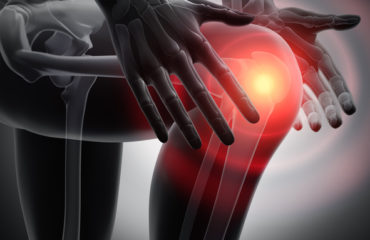There are three types of arthritis that can occur in your knee. Osteoarthritis is the most common one, which is slowly wears away your joint cartilage over time. This type of arthritis is seen after middle age in most cases. Rheumatoid arthritis is an inflammatory condition that can occur at any age, even in children. The third type is post traumatic arthritis, which develops after a knee injury, and it can occur at any time after a ligament injury, torn meniscus, or knee fracture. Let’s look at 5 symptoms of arthritis.
#1. A Gradual Increase in the Pain You Have
Occasionally the arthritis pain will come on suddenly; however, in most cases it develops slowly over time. In the beginning you  might notice pain when you first get up in the morning or after you have been inactive for a while. Your knees might start to hurt when you climb stairs, kneel, or stand up after sitting. It may even hurt to go for a walk. You can even feel pain when you are just sitting. If your knee pain wakes you up at night this can be a sign of osteoarthritis.
might notice pain when you first get up in the morning or after you have been inactive for a while. Your knees might start to hurt when you climb stairs, kneel, or stand up after sitting. It may even hurt to go for a walk. You can even feel pain when you are just sitting. If your knee pain wakes you up at night this can be a sign of osteoarthritis.
#2 There is Tenderness and/or Swelling
Arthritis of the knee can cause inflammation periodically. This can be because of bone spurs that form or extra fluid on the knee. If you have been inactive for a long period of time the swelling can be worse. The skin on your knee can look read and be warm to the touch. You may find that over time the inflammation no longer responds to over the counter medications.
#3 Cracking or Popping Sounds
When you move your knee, you might feel a grinding sensation. You could even hear cracking and/or popping sounds from your knee. This symptom occurs when the smooth cartilage responsible for providing a smooth range of motion has become rough or there are bone spurs rubbing.
#4 Your Knee Buckles or Locks
Your knee muscles can weaken over time and the structure of the joint can become unstable. If you have overall weakness in the knee, it can cause your knee to buckle. It can also cause it to lock so you can’t bend it or straighten it. These symptoms can come and go. A locking knee can become permanently locked and require an Orthopedic Surgeon Phoenix to repair it.
#5 You Have a Poor Range of Motion
Arthritis challenges the knee’s ability to glide smoothly as it should and this can make simple movement that you used to make  impossible or next to impossible now. You may notice a restriction in motion when you climb the stairs or try to take part in athletic activities.
impossible or next to impossible now. You may notice a restriction in motion when you climb the stairs or try to take part in athletic activities.
Osteoarthritis will wear the cartilage away over time. As your arthritis gets worse it becomes more difficult for joints to move normally and function as they should. It makes it harder and harder to do the simple day-to-day tasks. It’s a good idea to seek out the best orthopedic surgeon in Phoenix before you need a walker or cane so that it can be determined if you are a candidate for knee replacement surgery.



